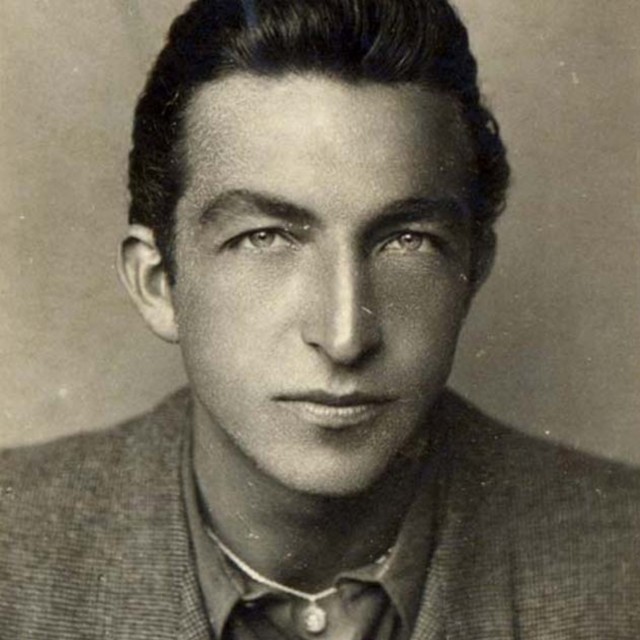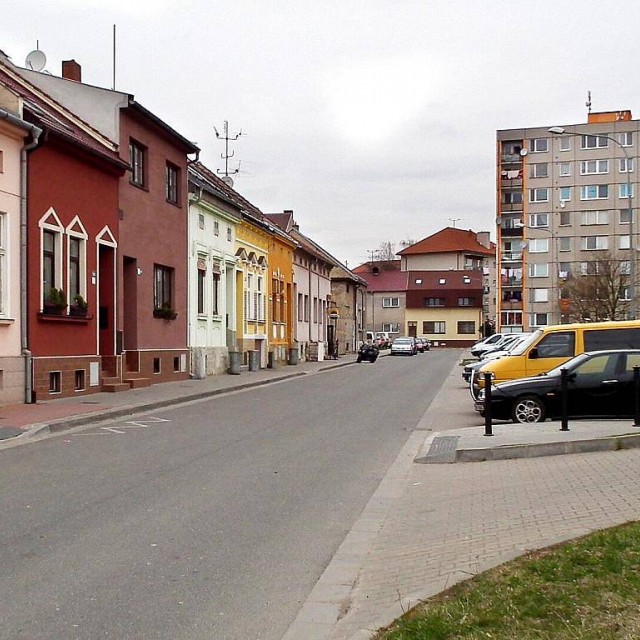They shot a policeman, he didn't want to surrender
The police lieutenant and state security (StB) agent Alois Dyčka was awaited by two resistance fighters – Vetejška and Bušek – in front of his house in Hodonín. They had waited until it became dark. Dyčka arrived in his car, parked in front of the house, got out and opened the heavy door to the courtyard. He left the headlamps on. At that moment, Vetejška and Bušek, who had been standing about fifty meters away from the house, began walking towards their target. In order not to raise Dyčka's suspicion, they were whistling some tune. Both held their pistols in their hands hidden in the pockets of their coats. Vetejška pulled out his gun and fired two shots in the back of the SNB lieutenant, who was just pushing the wooden door. This is the account of the event as given by the StB investigation file. Witnesses, who cooperated with the resistance fighters and who later had an opportunity to speak to them, claim, that in fact Vetejška asked Dyčka to put his hands up. Dyčka, however, turned sharply around and pulled his pistol, which he would always keep readily at hand. Bušek was standing about two meters away from Dyčka on the other side and was aiming at the StB agent. Vetejška fired and hit Dyčka, who stumbled and leaned with his full weight on the door. The door gave in and opened with a creak. Dyčka returned fire and hit Vetejška in the jaw. More shots were fired and hit the bonnet and the headlights of the car, eliminating the only light in the street. At that moment, Bušek fired and hit Dyčka with two shots in the stomach and the chest. The wounded Vetejška ran toward Slavíkova Street, located about one hundred meters away from the site of the shooting. He found himself in an open space and thus became a perfect target. Bušek ran across the street and hid in a house on the opposite side of the street. Dyčka fired one shot at Vetejška but missed. The hidden Bušek fired back, missed, and the second shot jammed itself in the chamber of the gun. The mortally wounded Dyčka fell on the ground on the sidewalk. Bušek got out of the house where he was hiding and caught up with Vetejška. The scouts from Dolní Bojanovice and anti-communist resistance fighters, former political prisoners Petr Vymyslický and Pavel Hubačka, claim that the plan was to kidnap Dyčka. They wanted to put him on a car and take him to Austria, where he would be put before the court. Both of them were involved in this event. Vymyslický's task was to watch Dyčka's car in front of the oil works in Hodonín: "If his car stood in front of the plant, I would tell Vetejška. If it wasn't there, I was supposed to go home. But when I got there, Dyčka was just getting inside the car and leaving, so I biked home", says Vymyslický. According to him, Vetejška and Bušek made a mistake, as they didn't start shooting right away, if they really wanted to kill him. Pavel Hubačka says that he was waiting near to the site with a car, ready to take the kidnapped Dyčka away. However, he doesn't want to reveal who and in which way was supposed to help them taking Dyčka abroad: "It's too sensitive. To this day, there are people - former members of the state security – alive, who might want to retaliate", explains Hubačka, who treated the wounded Vetejška after the action. He pulled out the bullet with a screwdriver from the head of the unconscious Vetejška in a basement.
Hodnocení
Hodnotilo 0 lidí
Routes
Comments
- Radomír Silber
2019-02-15 18:37:54 - Ze stenozáznamu z veřejného jednání Poslanecké sněmovny 28. února 2018: Digitální knihovna › PČR, PS 2017-... › Stenoprotokoly › 7. schůze › Středa 28. února 2018 Poslanec Stanislav Juránek (KDU-ČSL): Vážený pane předsedající, děkuji za slovo, ... mám jeden osobní vzkaz, vzkaz právě směrem ke komunistické straně, který jsem ještě nikdy nemohl takto předat, a je to vzkaz od mého již zemřelého strýce, který se jmenoval Karel Procházka, ať tady také zazní konkrétní jméno, který byl v roce 1948 odsouzen na 11 let za to, že organizoval pouť orelskou na Hostýn. Ano, teď jsem se nedávno dočetl, že je to považováno za největší protest proti komunismu v celé východní Evropě, protože během tří dnů se této pouti zúčastnilo prokazatelně více než sto tisíc lidí. A můj strýc za to byl odsouzen. Čistě náhodou byl tam, kde působil otec současného poslance, který zde velmi pečlivě mluvil přede mnou, a tento byl člověkem, který se nějakým způsobem k mému strýci zachoval. Když byl strýc živ, a tehdy se mluvilo ještě hodně o Grebeníčkovi jako o takovém příkladu toho, jakým způsobem se chovali v minulé době komunisté vůči svým vězňům, a byl vydáván za odstrašující příklad. A já teď zcela veřejně řeknu ten vzkaz svého strýce. On říkal: "Nevěř tomu, co se říká. Grebeníček byl nejmírnější, nejjasnější a nejlepší ze všech, kteří se vůči nám chovali. My jsme vždycky věděli, co udělá, na rozdíl od těch ostatních." Orel Dr. Miroslav Kozlovský, tiskový mluvčí bývalého Přípravného výboru pro obnovu Orla "Uvádím seznam příslušníků StB Uh. Hradiště, z nichž většina byla zapojena do vyšetřování našich členů: Hlavačka – velitel StB, vyšetřoval el. Proudem, Mareček – vyšetřoval el. proudem, Prokeš, Vyšinka – sadista, Dostál, Jelínek, Vrága, Říha, Šimčák, Obdrálek, Hučín, Kovář, Bláha, Kartuz, Lovecký, Haluza, Jež, Ondra – vyšetřoval el. Proudem, Kryštof Čejka, Hanáček, Němeček, Rašile, Trubač, Vrána – sadista, Vranka, Gajdošík, Fridrich, Panáček, Veselý, Gagášek, Šerý, Růžička, Knot, Cyprys, Karásek, Olič, Řezníček, Radůněk, Žák, Beň, Čáň – vyslýchal el. proudem, Holub – sadista, Zavadilík, Grebeníček. Dnes většina z nich nežije. Kampaň proti Grebeníčkovi, otci dnešního politika, je částečně účelová, poněvadž Grebeníček st. nepatřil mezi ty nejhorší vyšetřovatele."



